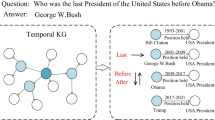Abstract
Temporal event reasoning is vital in modern information-driven applications operating on news articles, social media, financial reports, etc. Recent works train deep neural nets to infer temporal events and relations from text. We improve upon the state-of-the-art by proposing an approach that injects additional temporal knowledge into the pre-trained model from two sources: (i) part-of-speech tagging and (ii) question constraints. Auxiliary learning objectives allow us to incorporate this temporal information into the training process. Our experiments show that these types of multi-source auxiliary learning objectives lead to better temporal reasoning. Our model improves over the state-of-the-art model on the TORQUE question answering benchmark by 1.1% and on the MATRES relation extraction benchmark by 2.8% in F1 score.
Work done as a Research Intern at Dataminr, Inc.
Access this chapter
Tax calculation will be finalised at checkout
Purchases are for personal use only
Similar content being viewed by others
References
Bird, S., Klein, E., Loper, E.: Natural Language Processing with Python. O’Reilly Media (2009)
Chambers, N., Cassidy, T., McDowell, B., Bethard, S.: Dense event ordering with a multi-pass architecture. Trans. Assoc. Comput. Linguist. 2, 273–284 (2014)
Devlin, J., Chang, M.W., Lee, K., Toutanova, K.: BERT: pre-training of deep bidirectional transformers for language understanding. In: Proceedings of the 2019 Conference of the North American Chapter of the Association for Computational Linguistics: Human Language Technologies, Volume 1 (Long and Short Papers), pp. 4171–4186. Association for Computational Linguistics, Minneapolis, Minnesota, June 2019. https://doi.org/10.18653/v1/N19-1423, https://www.aclweb.org/anthology/N19-1423
Han, R., Ning, Q., Peng, N.: Joint event and temporal relation extraction with shared representations and structured prediction. In: Proceedings of the 2019 Conference on Empirical Methods in Natural Language Processing and the 9th International Joint Conference on Natural Language Processing (EMNLP-IJCNLP), pp. 434–444. Association for Computational Linguistics, Hong Kong, China (2019). https://doi.org/10.18653/v1/D19-1041, https://www.aclweb.org/anthology/D19-1041
Han, R., Ren, X., Peng, N.: Deer: A data efficient language model for event temporal reasoning. arXiv preprint arXiv:2012.15283 (2020)
Jaderberg, M., et al.: Reinforcement learning with unsupervised auxiliary tasks. In: 5th International Conference on Learning Representations, ICLR 2017, Toulon, France, 24–26 April 2017, Conference Track Proceedings. OpenReview.net (2017). https://openreview.net/forum?id=SJ6yPD5xg
Lan, Z., Chen, M., Goodman, S., Gimpel, K., Sharma, P., Soricut, R.: Albert: a lite bert for self-supervised learning of language representations. In: International Conference on Learning Representations (2020). https://openreview.net/forum?id=H1eA7AEtvS
Liu, S., Davison, A., Johns, E.: Self-supervised generalisation with meta auxiliary learning. In: Wallach, H., Larochelle, H., Beygelzimer, A., d’Alché-Buc, F., Fox, E., Garnett, R. (eds.) Advances in Neural Information Processing Systems, vol. 32. Curran Associates, Inc. (2019). https://proceedings.neurips.cc/paper/2019/file/92262bf907af914b95a0fc33c3f33bf6-Paper.pdf
Liu, X., He, P., Chen, W., Gao, J.: Multi-task deep neural networks for natural language understanding. In: Proceedings of the 57th Annual Meeting of the Association for Computational Linguistics, pp. 4487–4496. Association for Computational Linguistics, Florence, Italy, July 2019. https://doi.org/10.18653/v1/P19-1441, https://www.aclweb.org/anthology/P19-1441
Liu, Y., et al.: Roberta: A robustly optimized bert pretraining approach. arXiv preprint arXiv:1907.11692 (2019)
Ning, Q., Wu, H., Han, R., Peng, N., Gardner, M., Roth, D.: TORQUE: a reading comprehension dataset of temporal ordering questions. In: Proceedings of the 2020 Conference on Empirical Methods in Natural Language Processing (EMNLP), pp. 1158–1172. Association for Computational Linguistics, Online, November 2020. https://doi.org/10.18653/v1/2020.emnlp-main.88, https://www.aclweb.org/anthology/2020.emnlp-main.88
Ning, Q., Wu, H., Roth, D.: A multi-axis annotation scheme for event temporal relations. In: Proceedings of the 56th Annual Meeting of the Association for Computational Linguistics (Volume 1: Long Papers), pp. 1318–1328. Association for Computational Linguistics, Melbourne, Australia, July 2018. https://doi.org/10.18653/v1/P18-1122, https://www.aclweb.org/anthology/P18-1122
O’Gorman, T., Wright-Bettner, K., Palmer, M.: Richer event description: integrating event coreference with temporal, causal and bridging annotation. In: Proceedings of the 2nd Workshop on Computing News Storylines (CNS 2016), pp. 47–56 (2016)
Ruder, S.: An overview of multi-task learning in deep neural networks. arXiv preprint arXiv:1706.05098 (2017)
Trinh, T., Dai, A., Luong, T., Le, Q.: Learning longer-term dependencies in RNNS with auxiliary losses. In: International Conference on Machine Learning, pp. 4965–4974. PMLR (2018)
Wang, H., Chen, M., Zhang, H., Roth, D.: Joint constrained learning for event-event relation extraction. In: Proceedings of the 2020 Conference on Empirical Methods in Natural Language Processing (EMNLP), pp. 696–706. Association for Computational Linguistics, Online, November 2020. https://doi.org/10.18653/v1/2020.emnlp-main.51, https://www.aclweb.org/anthology/2020.emnlp-main.51
Xu, D., et al.: Multi-task recurrent modular networks. In: AAAI, vol. 35, no. 12, pp. 10496–10504 (2021)
Zhou, Y., et al.: Clinical temporal relation extraction with probabilistic soft logic regularization and global inference. arXiv e-prints pp. arXiv-2012 (2020)
Author information
Authors and Affiliations
Corresponding author
Editor information
Editors and Affiliations
Rights and permissions
Copyright information
© 2022 The Author(s), under exclusive license to Springer Nature Switzerland AG
About this paper
Cite this paper
Dong, X., Saha, T.K., Zhang, K., Tetreault, J., Jaimes, A., de Melo, G. (2022). Temporal Event Reasoning Using Multi-source Auxiliary Learning Objectives. In: Hagen, M., et al. Advances in Information Retrieval. ECIR 2022. Lecture Notes in Computer Science, vol 13186. Springer, Cham. https://doi.org/10.1007/978-3-030-99739-7_12
Download citation
DOI: https://doi.org/10.1007/978-3-030-99739-7_12
Published:
Publisher Name: Springer, Cham
Print ISBN: 978-3-030-99738-0
Online ISBN: 978-3-030-99739-7
eBook Packages: Computer ScienceComputer Science (R0)




